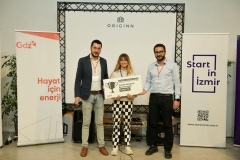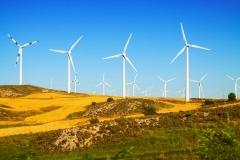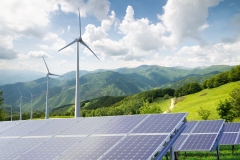
GRADUATE SCHOOL
Sustainable Energy (With Thesis)
SEN 507 | Course Introduction and Application Information
| Course Name |
Regulatory Issues in the Power Sector
|
|
Code
|
Semester
|
Theory
(hour/week) |
Application/Lab
(hour/week) |
Local Credits
|
ECTS
|
|
SEN 507
|
Fall/Spring
|
3
|
0
|
3
|
7.5
|
| Prerequisites |
None
|
|||||
| Course Language |
English
|
|||||
| Course Type |
Elective
|
|||||
| Course Level |
Second Cycle
|
|||||
| Mode of Delivery | - | |||||
| Teaching Methods and Techniques of the Course | - | |||||
| Course Coordinator | ||||||
| Course Lecturer(s) | ||||||
| Assistant(s) | ||||||
| Course Objectives | The course aims to develop an understanding related to principles & regulations in the power sector. For this purpose, at the beginning of the course, a brief introduction concerning regulation theory and power sector concepts will be given. Then development period in EU Energy Market with the focus on power market will be analyzed. The course will continue with examination of Turkish Energy Market Regulatory Authority and Turkish Power Sector. In this course, Turkish power sector will be examined within the scope of electricity, renewable energy. After giving detailed information about the electricity markets and legislation, the course will be completed with examination of the following subjects : administrative and punitive sanctions in electricity market- legislation, consumer regulations in the electricity market, emission trading/low carbon development and power market interaction. |
| Learning Outcomes |
The students who succeeded in this course;
|
| Course Description | The following topics will be examined: The concept of liberalisation& regulation, EMRA, EU Energy Market, current power market in Turkey and its legislation, administrative and punitive sanctions in the electricity market, relevant consumer regulations, emission trading/low carbon development and power market interaction. |
|
|
Core Courses | |
| Major Area Courses |
X
|
|
| Supportive Courses | ||
| Media and Management Skills Courses | ||
| Transferable Skill Courses |
WEEKLY SUBJECTS AND RELATED PREPARATION STUDIES
| Week | Subjects | Related Preparation |
| 1 | Introduction - Generally Energy Market & Energy Policy -Importance of Energy -Three pillar of Energy Market | Course Notes Bram DELVAUX/Michael HUNT/Kim TALUS-EU Energy Policy Law and Policy Issues, Euroconfidentiel |
| 2 | Regulation Theory and Main Concepts of Regulation General Information about the Course, History and Main Dynamics of Regulation Concept of Liberalisation/Regulation/De-regulation | Course Notes Robert BALDWIN / Martin CAVE: Understanding Regulation- Theory, Strategy and Practice, Oxford University Press, Newyork 1999. Wolf SAUTER/Harm SCHEPEL, State and Market in European Union Law, Cambridge Studies in European Law and Policy, Cambridge University Press, Cambridge 2009. |
| 3 | EU Energy Market “ Single European Energy Market” : Concept &Importance Energy Market before Liberalisation Period Restructuring of Energy Market and State’s Role Legal Structure of Energy Market EU Energy Union? | Course Notes Peter CAMERON, Competition in Energy Markets, Second Edition, Oxford University Press, Oxford 2007. |
| 4 | Turkish Energy Market&EMRA General Information about Turkish Energy Market Duties and Responsibilities of EMRA | Related Articles |
| 5 | Generally Power Sector & Development of Power Sector in Turkey Main Concepts Concerning Electricity Market Structural characteristics of Electricity Legal Status of Electricity- Goods? Services? History of development of Turkish Electricity Market General information on relevant legislations | Course Notes and Articles Yearly reports of EMRA on Electricity market Progress Reports prepared by European Commission Relevant Reports |
| 6 | Electricity Market Activities & Market Model within the Scope of relevant Legislations Generation Distribution Transmission Supply | Yearly and monthly Electricity Market reports prepared by EMRA Related Articles |
| 7 | Electricity Generation Sources & Models in Turkey and relevant legislations Coal, natural gas, renewable sources (solar, geothermal, wind,biomass) Licensed&Unlicensed Generation YEKA Model Energy Cooperatives Roof-top solar Incentives | Course Notes Legislation Related Articles |
| 8 | Electricity Generation Sources & Models in Turkey and relevant legislations Coal, natural gas, renewable sources (solar, geothermal, wind,biomass) Licensed&Unlicensed Generation YEKA Model Energy Cooperatives Roof-top solar Incentives | Course Notes Legislation Related Articles |
| 9 | Electricity Generation Sources & Models in Turkey and relevant legislations Coal, natural gas, renewable sources (solar, geothermal, wind,biomass) Licensed&Unlicensed Generation YEKA Model Energy Cooperatives Roof-top solar Incentives | Course Notes Legislation Related Articles |
| 10 | Electricity Generation Sources & Models in Turkey and relevant legislations Coal, natural gas, renewable sources (solar, geothermal, wind,biomass) Licensed&Unlicensed Generation YEKA Model Energy Cooperatives Roof-top solar Incentives | Course Notes Legislation Related Articles |
| 11 | Contracts in the power sector | Course Notes Mustafa YAVUZ, Elektrik Tedarik Sözleşmeleri, Özellikle İkili Antlaşma, Oniki Levha Yayıncılık, 2011 |
| 12 | Sanctions in the Electricity Market and other relevant issues | Legislation Course Notes Case- Law |
| 13 | Environmental Issues in Power Market Climate Change Low Carbon Development Emission Trading | Progress Reports prepared by European Commission Report on Roadmap for Emissions Trading Systems in Turkey Other relevant reports Relevant Articles |
| 14 | Consumer Regulations in EU & Turkish Electricity Market Concept of “Consumer” in Electricity Market Public Service Obligations and Consumer Protection Consumer Rights in Turkish Electricity Market Legislation | Course Notes |
| 15 | Review of the Course | |
| 16 | Review of the Semester |
| Course Notes/Textbooks | Parts from books that mentioned above, relevant Articles given by Lecturer and Lecturer’s notes |
| Suggested Readings/Materials | EMRA Reports, Progress Reports prepared by European Commission |
EVALUATION SYSTEM
| Semester Activities | Number | Weigthing |
| Participation | ||
| Laboratory / Application | ||
| Field Work | ||
| Quizzes / Studio Critiques | ||
| Portfolio | ||
| Homework / Assignments |
1
|
40
|
| Presentation / Jury |
2
|
30
|
| Project | ||
| Seminar / Workshop | ||
| Oral Exams | ||
| Midterm | ||
| Final Exam |
1
|
30
|
| Total |
| Weighting of Semester Activities on the Final Grade |
60
|
|
| Weighting of End-of-Semester Activities on the Final Grade |
40
|
|
| Total |
ECTS / WORKLOAD TABLE
| Semester Activities | Number | Duration (Hours) | Workload |
|---|---|---|---|
| Theoretical Course Hours (Including exam week: 16 x total hours) |
16
|
3
|
48
|
| Laboratory / Application Hours (Including exam week: '.16.' x total hours) |
16
|
0
|
|
| Study Hours Out of Class |
15
|
4
|
60
|
| Field Work |
0
|
||
| Quizzes / Studio Critiques |
0
|
||
| Portfolio |
0
|
||
| Homework / Assignments |
11
|
2
|
22
|
| Presentation / Jury |
2
|
5
|
10
|
| Project |
0
|
||
| Seminar / Workshop |
0
|
||
| Oral Exam |
0
|
||
| Midterms |
0
|
||
| Final Exam |
1
|
60
|
60
|
| Total |
200
|
COURSE LEARNING OUTCOMES AND PROGRAM QUALIFICATIONS RELATIONSHIP
|
#
|
Program Competencies/Outcomes |
* Contribution Level
|
||||
|
1
|
2
|
3
|
4
|
5
|
||
| 1 | To be able to comprehend the critical role and influences of energy resources, energy supply and energy demand for policy-makers, collectives and society. |
|||||
| 2 | To be able to evaluate the problems and circumstances about energy studies by using theoretical and practical knowledge in fundamental disciplines of energy studies such as geopolitics, market dynamics, technologies, risk management, environmental issues, legal issues, transportation, and strategies. |
X | ||||
| 3 | To be able to analyse multi-dimensional problems through working with others and to demonstrate leadership in addressing complex issues in the field of energy studies. |
X | ||||
| 4 | To be able to develop an understanding of the key energy policy issues relating to structures, markets, institutions, regulations, climate change and environment in a critical perspective. |
X | ||||
| 5 | To be able to acquire an informed opinion on contemporary methods, strategies and policies implemented in the international energy arena, and the ability to engage with policy-makers, business representatives, and regulators among others. |
X | ||||
| 6 | Be able to analyse, formulate, and handle energy related questions from a social science and humanities perspective, with an overview the theories, scenarios and concepts by using scientific research methods. |
|||||
| 7 | To critically evaluate data and systematically examine issues relating to the international energy arena, utilizing knowledge on recent developments in the scope of energy studies. |
|||||
| 8 | To be able to have ethical, social and scientific values in the stages throughout the processes of gathering, interpreting, disseminating and implementing data relevant to Energy. |
|||||
| 9 | To be able to prepare an original thesis/term project, utilizing appropriate methodologies of broad social sciences and humanities related disciplines applied to the questions and/or issues. |
|||||
| 10 | To be able to follow new research and developments, publish scientific articles and participate the debates in academic meetings in the field of Energy through a foreign language. |
X | ||||
*1 Lowest, 2 Low, 3 Average, 4 High, 5 Highest
NEWS |ALL NEWS

‘Double award’ for energy efficiency
Izmir University of Economics (IUE) received a double award at the ‘Innovative Idea Development Workshop in the Electricity Distribution Sector’ organized with

International investment for ‘Scootable’
Emrecan Durmaz, a student of Izmir University of Economics (IUE), who developed the software infrastructure that enables electric scooters and bicycles to

‘Social' analysis of energy’
Prof. Dr. Mehmet Efe Biresselioğlu from Izmir University of Economics (IUE) has implemented the ‘Cure’ project with 2 countries to measure the

THE ENERGY WORKSHOP AT IUE
Energy policies have been discussed at Izmir University of Economics (IUE). It has been reported at the “6th Energy Management and Policies

IUE STEERING EUROPE’S ENERGY
Izmir University of Economics will be steering energy policy of European Union. Department of Sustainable Energy of Izmir University of Economics will

ENERGY; FOCAL POINT OF TURKS AND CHINESE
Yu Hongyang, Ambassador of the People's Republic of China to Ankara, who was a keynote speaker at the 5th Energy Management and


